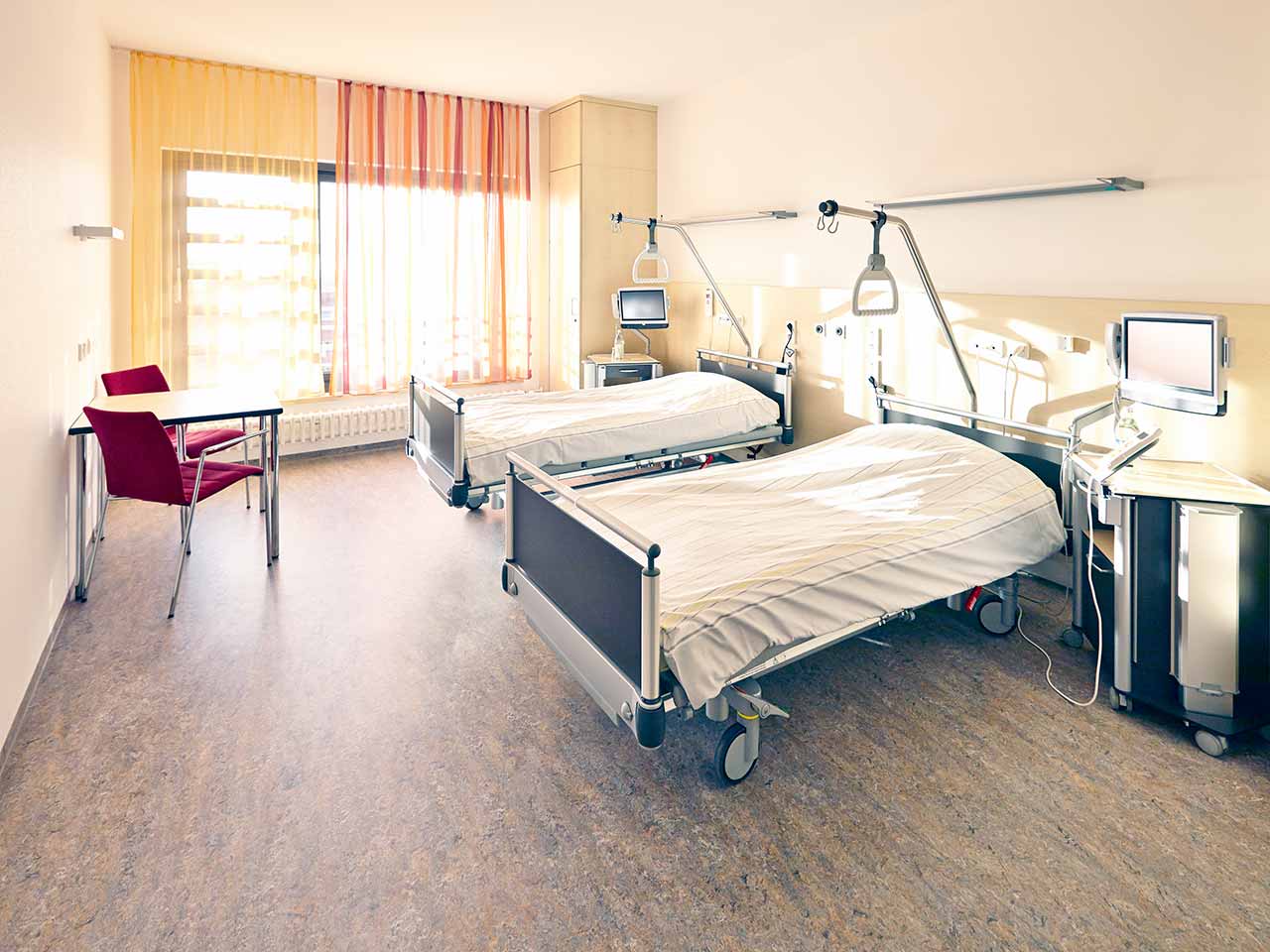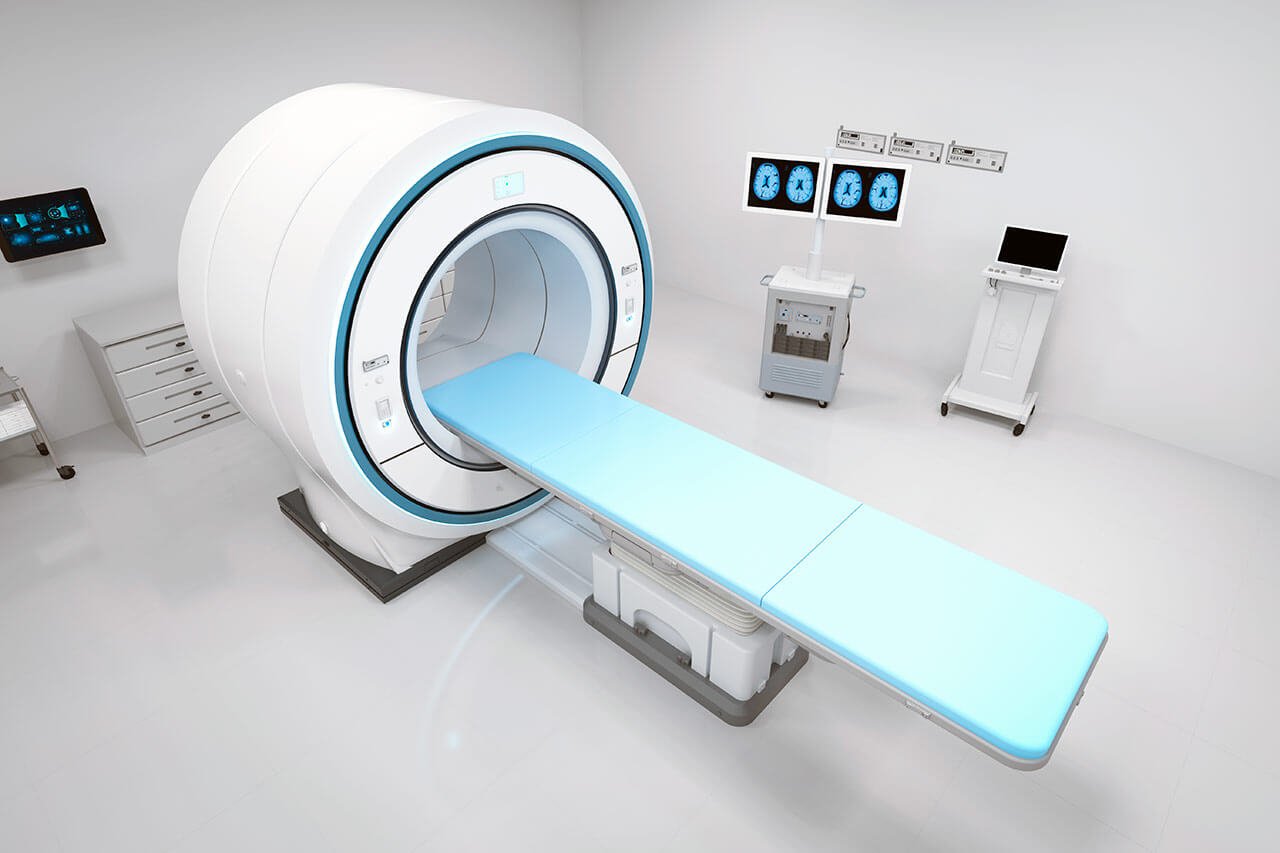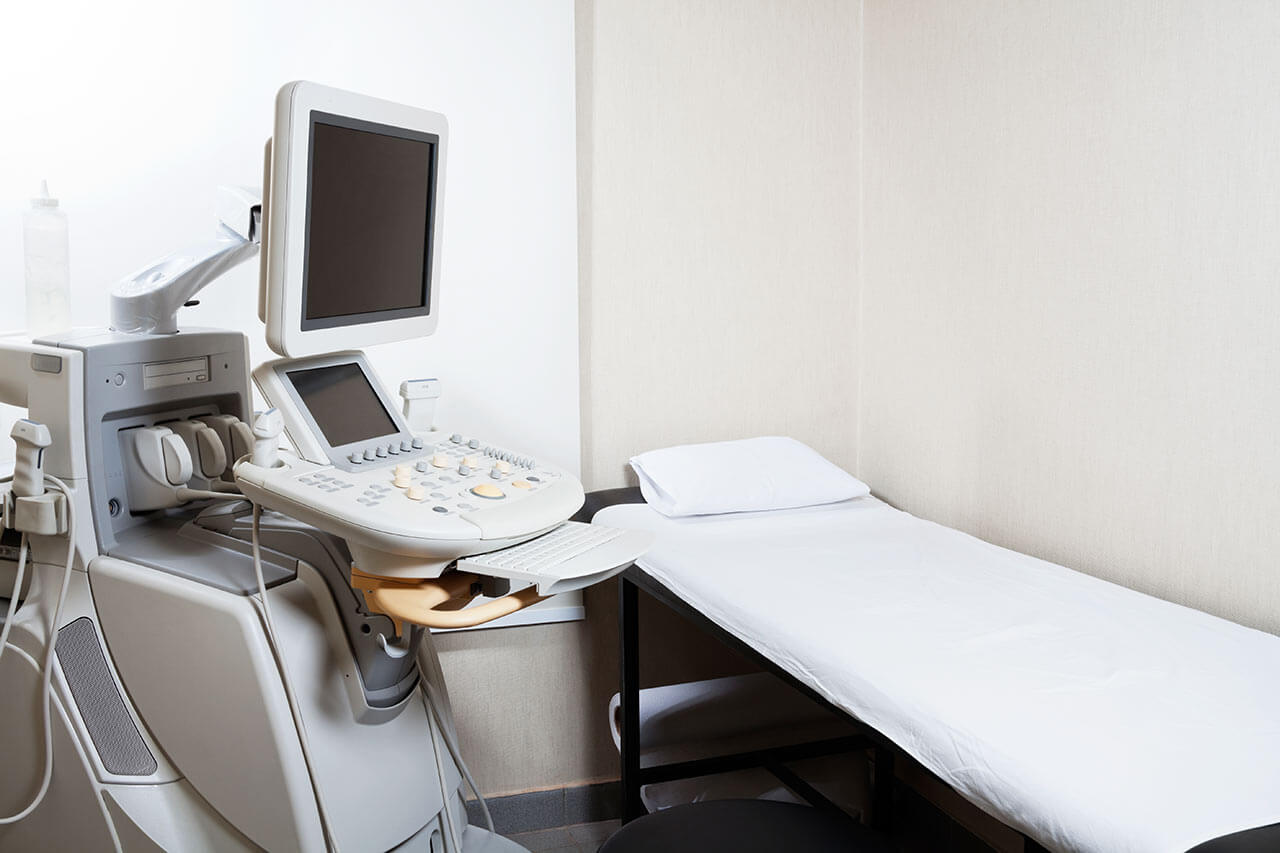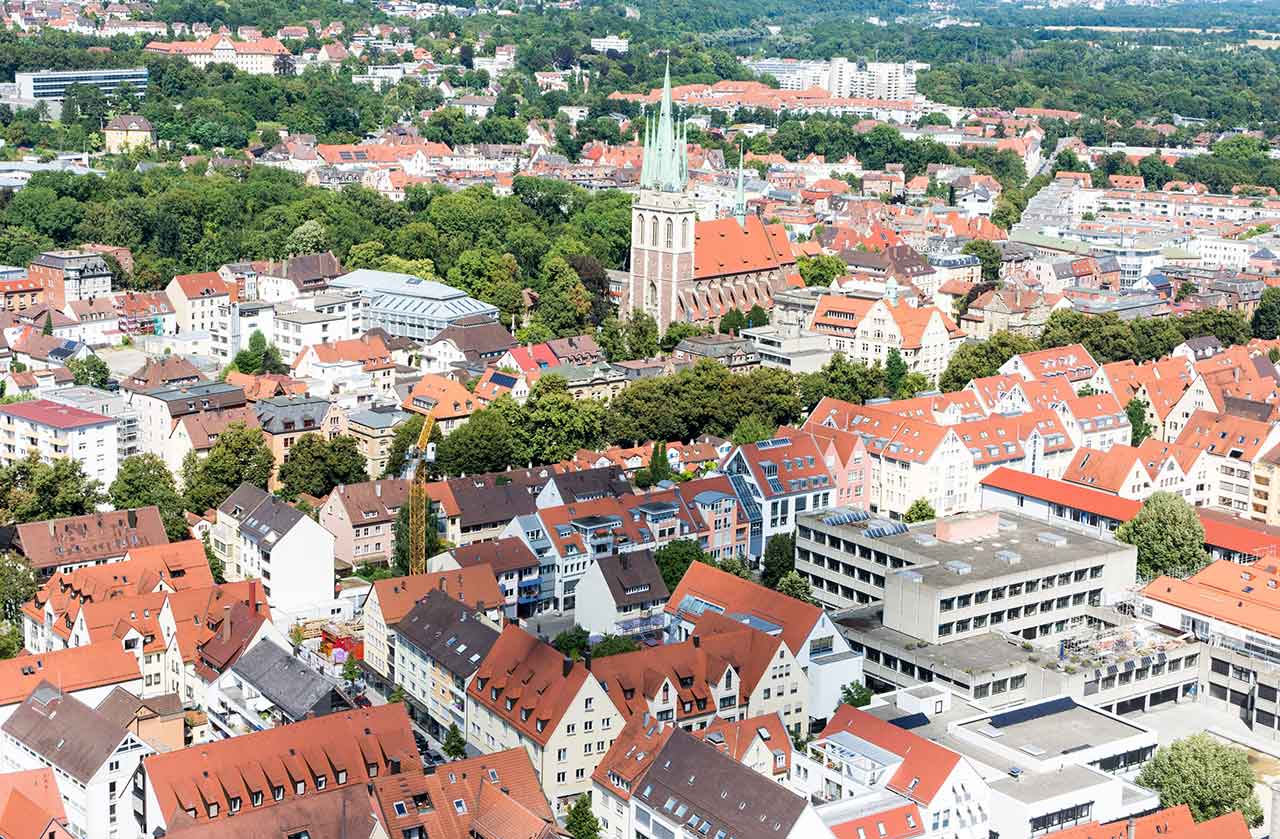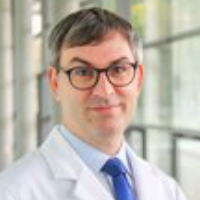
The program includes:
- Initial presentation in the clinic
- clinical history taking
- review of medical records
- physical examination
- ACTH stimulation test
- Insulin-induced hypoglycemia test
- laboratory tests:
- complete blood count
- general urine analysis
- biochemical analysis of blood
- TSH-basal, fT3, fT4
- cortisol and ACTH
- testosteron
- fkmljcnthjz
- inflammation indicators
- indicators blood coagulation
- ultrasound of the abdomen
- CT/MRI scan of the abdomen
- consultation of related specialists
- symptomatic specific treatment
- the cost of essential medicines and materials
- nursing services
- control examinations
- full hospital accommodation
- developing of further guidance
Required documents
- Medical records
- Results of hormone blood tests (if available)
Service
You may also book:
 BookingHealth Price from:
BookingHealth Price from:
About the department
The Department of Endocrinology at the University Hospital Ulm offers comprehensive diagnostics and treatment of endocrine diseases: the pituitary gland, thyroid gland, parathyroid glands, pancreas, adrenal glands, and gonads. The department's doctors are also competent at providing medical care to patients with metabolic disorders. The specialists at the medical facility regularly hold consultations on nutrition, including for patients with diabetes mellitus. The department has excellent diagnostic options for assessing the function of the endocrine system. Laboratory tests to determine hormone levels, functional tests, and ultrasound examinations are carried out here. Various imaging tests, such as computed tomography, magnetic resonance imaging, scintigraphy, and positron emission tomography, are performed in collaboration with the Department of Radiology and the Department of Nuchal Medicine. The department's doctors mostly prescribe drug therapy for the treatment of endocrine diseases. With appropriate clinical indications, endocrinologists, in cooperation with highly specialized experts, conduct peptide receptor radionuclide therapy and radioiodine therapy. The doctors at the medical facility ensure the highest quality of medical care, which is based on an individual approach to each patient. The department is headed by Prof. Dr. med. Martin Heni.
The department admits patients with thyroid diseases such as hypothyroidism (insufficient production of thyroid hormones), hyperthyroidism (excessive production of thyroid hormones), goiter, thyroiditis, and thyroid cancer. The department's specialists prescribe a complex of diagnostic tests, including a clinical examination, thyroid palpation, laboratory tests to assess the hormone levels (TTG, free T4, and free T3), a complete blood count, and ultrasound scans to confirm the diagnosis. With appropriate indications, thyroid scintigraphy can also be carried out (in the Department of Nuclear Medicine). As for the treatment, the department's specialists most often prescribe drug therapy. The optimal dose of drugs and the duration of their intake are determined on an individual basis. During therapy, doctors prescribe iodine medications, thyreostatics, hormones, antibiotics, anti-inflammatory drugs, etc. Radioiodine therapy may also be carried out for hyperthyroidism, thyroid cancer, and toxic nodular goiter. This type of treatment is carried out in collaboration with specialists in nuclear medicine.
The department's team of endocrinologists has long experience in the treatment of type 1 and type 2 diabetes mellitus. In most cases, the specialists deal with the treatment of type 2 diabetes mellitus, which develops due to reduced tissue sensitivity to insulin and the subsequent functional impairment of pancreatic cells producing this hormone. Risk factors for the development of type 2 diabetes mellitus include genetic predisposition, excess weight, sedentary lifestyle, unbalanced diet, pancreatitis, pancreatic tumors, etc. The primary diagnostic method is a blood glucose test. For a comprehensive assessment of the patient's condition, doctors prescribe other laboratory tests, ECG, a chest X-ray, 24-hour blood pressure monitoring, and dopplerography of the blood vessels of the lower extremities. To compensate for type 2 diabetes mellitus, patients need comprehensive therapy that combines dietary adjustments, oral pills or injectable hypoglycemic drugs, and regular exercise. Weight reduction also plays a crucial role in the success of treatment for patients with excess weight.
The specialists at the medical facility demonstrate high success rates in the treatment of Cushing's syndrome. This disease is characterized by an elevated cortisol level, which is produced by the adrenal glands. Cushing's syndrome provokes the development of lipid metabolism disorders, osteoporosis, cardiovascular lesions, hyperglycemia, and mental disorders. If untreated, it may lead to bone fractures, heart failure, or respiratory failure. If Cushing's syndrome is suspected, the patient undergoes laboratory tests, including a blood glucose test, a biochemical blood test, a 24-hour urine cortisol analysis, and blood tests for ACTH, potassium, and sodium. CT and/or MRI scans of the adrenal glands and a brain MRI scan may also be performed. The key task of doctors during the treatment of Cushing's syndrome is to normalize the cortisol levels and alleviate the symptoms of the disease. A treatment regimen is based on taking medications that suppress hormone production in the adrenal cortex.
The department's key clinical focuses include:
- Diagnostics and treatment of thyroid diseases: hypothyroidism, hyperthyroidism, goiter, thyroiditis, and thyroid cancer
- Diagnostics and treatment of type 1 and type 2 diabetes mellitus
- Diagnostics and treatment of endocrine-related arterial hypertension
- Diagnostics and treatment of lipid metabolism disorders
- Diagnostics and treatment of metabolic syndrome
- Diagnostics and treatment of rare metabolic disorders
- Diagnostics and treatment of hirsutism (excessive hair growth) in women and polycystic ovary syndrome
- Diagnostics and treatment of gynecomastia in men
- Diagnostics and treatment of galactorrhea
- Diagnostics and treatment of diabetes insipidus
- Diagnostics and treatment of pituitary diseases
- Diagnostics and treatment of Cushing's syndrome
- Diagnostics and treatment of osteoporosis
- Diagnostics and treatment of calcium metabolism disorders
- Diagnostics and treatment of metabolic bone disorders
- Diagnostics and treatment of other endocrine diseases
Curriculum vitae
Higher Education and Postgraduate Training
- 2001 - 2003 Medical studies, Ernst Moritz Arndt University of Greifswald.
- 2003 - 2008 Medical studies, Eberhard Karl University of Tuebingen.
- 2004 - 2006 Fellowship from the German Research Foundation (DFG), study of cellular mechanisms of pathological processes related to the immune response.
- 2008 Admission to medical practice.
- 2015 Board certification in Internal Medicine, Endocrinology, and Diabetology.
- 2015 Habilitation.
- 2018 Extraordinary Professorship, Eberhard Karl University of Tuebingen.
- 2019 - 2022 Research Coordinator of the Institute of Diabetes Research and Metabolic Diseases (IDM) of the Helmholtz Center Munich at the Eberhard Karls University of Tuebingen.
Research Interests
- Clinical experimental and translational studies on the impact of hormones on the brain and regulation of peripheral metabolism, body mass, and distribution of adipose tissue in the organism.
- Regulation of insulin sensitivity and insulin secretion in humans.
- Pathogenesis, prevention, and treatment of prediabetes and type 2 diabetes mellitus.
- Biomarkers.
Prizes, Awards, and Honors
- 2022 Minkowski Prize from the European Association for the Study of Diabetes (EASD).
- 2019 Ferdinand Bertram Prize from the German Diabetes Association (DDG).
- 2018 European Young Investigator Award from the International Diabetes Federation (IDF).
- 2016 Menarini Award from the German Diabetes Association (DDG).
- 2015 Rising Star Award from the European Association for the Study of Diabetes (EASD).
- 2015 Silvia King Prize from the German Diabetes Association (DDG).
- 2012 Prize from the German Center for Diabetes Research (DZD).
Memberships in Professional Societies
- German Society for Clinical Chemistry and Laboratory Medicine (DGKL).
- German Diabetes Association (DDG).
- German Society of Internal Medicine (DGIM).
- German Society of Endocrinology (DGE).
- European Association for the Study of Diabetes (EASD).
- American Diabetes Association (ADA).
Photo of the doctor: (c) Universitätsklinikum Ulm
About hospital
The University Hospital Ulm is an advanced medical complex that provides patients with high-class medical care using the very latest scientific achievements. The medical facility has been performing successful clinical activities for more than 40 years and has long earned an excellent reputation throughout Europe. The hospital regularly demonstrates high treatment success rates, takes an active part in the training of medical students, and works tirelessly on promising research projects.
The university hospital consists of 29 specialized departments and 16 scientific institutes, where more than 7,000 highly qualified employees work for the benefit of their patients. More than 55,000 inpatients and about 300,000 outpatients are treated here every year. The hospital has 1,274 beds. The medical team of the hospital is focused on providing personalized medical services using the most modern and sparing diagnostic and treatment methods.
The University Hospital Ulm is the largest medical complex in the region, and practically all areas of modern medicine are represented here. Transplantology and oncology are among the priority areas of clinical activity in the medical facility. The hospital holds leading positions in the world in bone marrow transplantation. In addition, the hospital has advanced experience in cancer treatment. The Comprehensive Cancer Center is recognized as the leading facility of this kind in the country, and it is certified by the German Cancer Society (DKG). It provides effective treatment for various types of cancer. The center also offers innovative CAR T-cell therapy. In addition, the Cancer Center is actively engaged in research activities to improve available treatment methods and develop innovative therapeutic techniques to fight cancer.
Along with the use of advanced technologies, doctors show respect, understanding, and a humane attitude toward the patient. The medical team includes competent psychologists, who are always ready to provide assistance and support to the patients and their families during the therapeutic process.
Photo: (с) depositphotos
Accommodation in hospital
Patients rooms
The patients of the University Hospital Ulm live in comfortable single and double rooms with a modern design and light colors. All patient rooms have an ensuite bathroom with a toilet and a shower. The patient room furnishings include a comfortable automatically adjustable bed, a bedside table, a wardrobe, a table and chairs, a telephone, a radio, and a TV. Wi-Fi access is also available in patient rooms.
The hospital also offers enhanced-comfort rooms, which additionally have a safe, a refrigerator, and upholstered furniture. The bathroom in the enhanced-comfort room has changeable towels, a cosmetic mirror, a hairdryer, and toiletries.
Meals and Menus
Patients and their accompanying person are offered three meals a day: breakfast, lunch, and dinner. The patient and accompanying person have a choice of three menus every day, including a vegetarian menu. Patients staying in the enhanced-comfort rooms are also offered light snacks, fruits, desserts, and hot and cold drinks in the comfortable lounge area.
If, for some reason, you do not eat all the foods, you will be offered an individual menu. Please inform the medical staff about your dietary preferences prior to treatment.
Further details
Standard rooms include:
![]() Shower
Shower
![]() Toilet
Toilet
![]() Wi-Fi
Wi-Fi
![]() TV
TV
Religion
The hospital has a chapel where Catholic and Protestant services are held weekly. The services are also broadcast on the internal television channel of the hospital. The chapel is open 24 hours a day for visits and prayers.
The services of other religious representatives are available upon request.
Accompanying person
Your accompanying person may stay with you in your patient room or at the hotel of your choice during the inpatient program.
Hotel
You may stay at the hotel of your choice during the outpatient program. Our managers will support you for selecting the best option.
